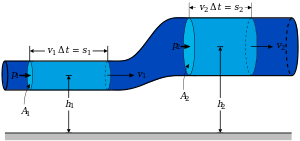Fluid
| Continuum mechanics | ||||||

| ||||||
| Conservation of mass Conservation of momentum Navier–Stokes equations Tensors
| ||||||
A fluid is defined as a substance that continually deforms (flows) under an applied shear stress regardless of the magnitude of the applied stress. It is a subset of the phases of matter and includes liquids, gases, plasmas and, to some extent, plastic solids.
Fluids are also divided into liquids and gases. Liquids form a free surface (that is, a surface not created by their container) while gases do not. The distinction between solids and fluids is not so obvious. The distinction is made by evaluating the viscosity of the matter: for example silly putty can be considered either a solid or a fluid, depending on the time period over which it is observed.
Fluids share the properties of not resisting deformation and the ability to flow (also described as their ability to take on the shape of their containers). These properties are typically a function of their inability to support a shear stress in static equilibrium. While in a solid, stress is a function of strain, in a fluid, stress is a function of rate of strain. A consequence of this behavior is Pascal's law which entails the important role of pressure in characterizing a fluid's state.
Based on how the stress depends on the rate of strain and its derivatives, fluids can be characterized as:
- Newtonian fluids : where stress is directly proportional to rate of strain, and
- Non-Newtonian fluids : where stress is proportional to rate of strain, its higher powers and derivatives (basically everything other than Newtonian fluid).
The behavior of fluids can be described by a set of partial differential equations, which are based on the conservation of mass, linear and angular momentum (Navier-Stokes equations) and energy.
The study of fluids is fluid mechanics, which is subdivided into fluid dynamics and fluid statics depending on whether the fluid is in motion or not.
See also
- Rheology
- Thermodynamics
- Superfluid
- Perfect fluid
| General subfields within physics | |
|
Atomic, molecular, and optical physics | Classical mechanics | Condensed matter physics | Continuum mechanics | Electromagnetism | General relativity | Particle physics | Quantum field theory | Quantum mechanics | Special relativity | Statistical mechanics | Thermodynamics | |
ar:مائع cs:Tekutina de:Fluid es:Fluido fa:شاره fr:Fluide io:Fluido id:Fluida it:Fluido ku:Şileme mk:Флуид nl:Fluïdum no:Fluid pl:Płyn pt:Fluido sl:Tekočina fi:Fluidi sv:Fluid zh:流體